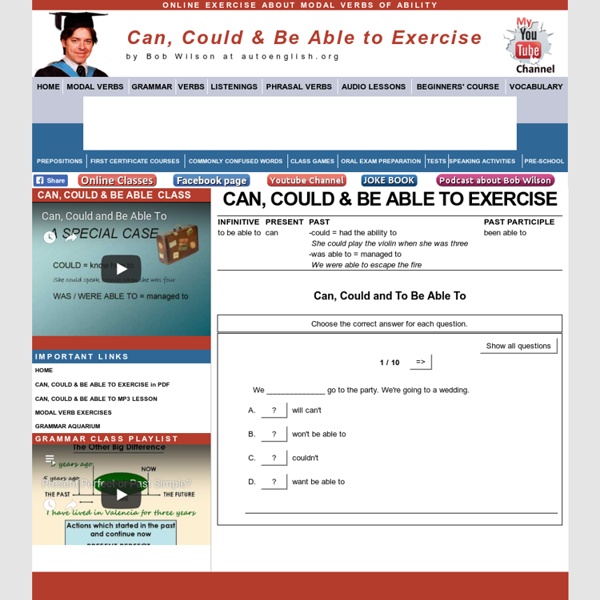Can, Could and Be Able To Exercise
We ______________ go to the party. We're going to a wedding. will can't won't be able to couldn't want be able toHe __________ pass the exam if he studied harder. would be able to will be able to canI __________ remember his name. fish 'm not able to can'tThey ____________ go. The weather was too bad. couldn't weren't able to can'tSorry, Teacher. I ____________ do it yet. wasn't able to haven't been able to couldn'tShe _____________ come on holiday next month if her parents give her permission. 'll be able to can't couldThe fishing boat sank but luckily all the crew ____________ save themselves. were able to was able to couldA.
English grammar for kids | Tense printables
nouns In this unit you will learn about nouns, a very important part of English grammar. Choose the topic you want to learn, study the grammar explanations, do some exercises, then take online tests and print out our worksheets. You can work through the unit systematically or in any chosen order. Have fun! verbs In this unit you will learn about verbs, a very important part of English grammar. english grammar for kids This section contains online lessons, activities and tests plus printable worksheets that can help children develop their grammar skills.
Welcome to English Grammar Express
Irregular verbs straightforward - Games to learn English | Games to learn English
I have already tried teaching irregular verbs in many ways. I have tried irregular verbs associative method, irregular verbs listening drill, irregular verbs in context and many others. However, the results were not very good. Only about half of the students know the verbs. That is why in my next four posts I would like to present 100 irregular verbs straightforward. I will provide the pronunciation of all the verbs and several simple activities for students to practice the verbs. First, watch the video and repeat the words. The second half of the verbs is presented in the following video: Irregular verbs – worksheets The first worksheet contains all the verbs in a table. Irregular verbs 01_all Then there are two worksheets containing activities to practice the irregular verbs from the two videos. Irregular verbs_worksheetIrregular verbs_worksheet_key The activities for the second video are over here:Irregular verbs 2 _worksheetIrregular verbs 2_worksheet_key Irregular verbs – quizzes
Comparatives Superlatives - ESL EFL Teaching Resources
Classroom Survey ESL EFL Writing and Speaking Activity - Elementary - 25 Minutes This delightful ESL activity enables you to teach comparatives and superlatives in a personalized manner. Students answer six questions and write the answers in a table. Classroom Survey.PDF Free Comparative and Superlative Practice ESL EFL Lesson - Elementary - 2 Hours This five-page lesson is useful for teaching or reviewing comparatives and superlatives. Comparative and Superlative Practice.PDF Free Comparative and Superlative Quiz ESL EFL Writing Activity - Elementary - 25 Minutes This rewarding teaching activity gives students practice at writing comparative and superlative sentences. Comparative and Superlative Quiz.PDF Exclusive Comparative Cards ESL EFL Writing and Speaking Activity - Elementary - 35 Minutes Here is an engaging card game that helps students associate comparatives with a variety of nouns. Comparative Cards.PDF Free Comparative Geography ESL EFL Writing Activity - Elementary - 25 Minutes
Present Simple And Present Continuous Revision - Lessons
Present simple or continuous John and Mary are at home now. They (watch) the news. Kate always (get) up at seven on Mondays. She (not / read) a newspaper at the moment. Where are the children?
English B1
May 14 2015 Writing and speaking exam Speaking Sample Writing Sample Find below the document we used in class to practice the speaking. Here is a very useful link with many resources to improve the writing. Task Type 1: – informal e-mail (writing to a friend explaning something, asking for news, givin information about something, describing a person or a place, etc. Task Type 2: – blog post (explaining a narrative story, describing someone, describing a place) – article (about food, sports, etc.) Listening Exam Practice Here you have some options to practice for the listening test. A) Ejercicios de Inglés: listening exam B) Remember that ELLLO is a great tool to practice your listening. 1. 2. 3. 4. 5. 6. 7. 8. C) You can also practice with official exams such as the IELTS, here you have some links: Listening Part 1, Listening Part 2, Listening Part 3, Listening part 4 D) LINGUASSIST (each unit has a listening) E) WORKBOOK (each units has listenings and you have the answer key) May 13 2015 What we did:
Related:
Related:



